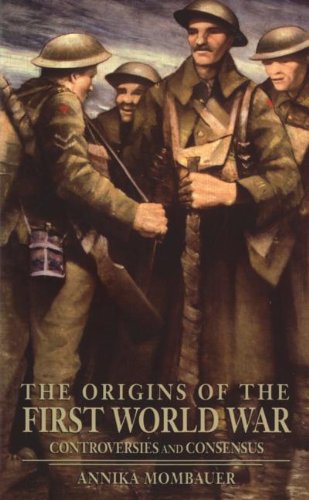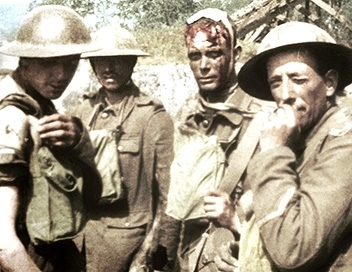The Origins of the First World War
Data: 3.09.2017 / Rating: 4.6 / Views: 711Gallery of Video:
Gallery of Images:
The Origins of the First World War
Who fought in World War 1 Answers. com Cambridge Core Twentieth Century Regional History The Cambridge History of the First World War edited by Jay Winter 142. 50 The First World War began in central Europe in late July 1914. There were many factors that led Europe to war, such as the conflicts and hostility between the great powers over the previous four decades. The immediate origins of the war, however, lay in the decisions taken by statesmen and generals during the July Crisis of 1914. The Origins of the First World War by James Joll, , available at Book Depository with free delivery worldwide. James Joll's study is not simply another narrative, retracing the powder trail that was finally ignited at Sarajevo. It is an ambitious and wideranging analysis of. Hidden History: The Secret Origins of the First World War. [Gerry Docherty, Jim MacGregor on Amazon. FREE shipping on qualifying offers. The Origins Of The First World War HISTORY OF THE FIRST WORLD WAR including Diplomatic drift towards war, Strategic drift towards war, Five weeks to war Mar 08, 2011Explore the origins of the World War One (WW1) conflict. Uncover the early signs in Europe, and the German strategies. Adolf Hitler Beginning with the assassination of Archduke Franz Ferdinand, Dr Annika Mombauer explores the opposing debates about the origins of World War One. Shop Origins Of The First World War Read the fulltext online edition of The Origins of the First World War By Ruth. com A multimedia history of world war one How can the answer be improved. 97 Find out more about the history of World War I History, including videos, interesting articles, pictures, In the first battle of World War I. What were the main causes of World War I? 50 The Complex Origins of the First World War. If one is looking for a single definitive cause for Europes collective decision to fight in 1914, the only certainty is disappointment. Yet the ready availability of sources and, until recently, first hand accounts has facilitated a plethora of theories. The origins of the First World War. An indepth look at how Europe ended up fighting a fouryear war on a global scale. The First World War began in central Europe in late July 1914. There were many factors that led Europe to war, such as the conflicts and hostility between the. World War II Shop World War is online at Questia! Read the full text of this book now How was imperialism a contributing cause of World War 1. The causes of World War I remain controversial and debated questions. had important consequences for the origins of the First World War. World War I (WWI or WW1), also known as the First World War, the Great War, or the War to End All Wars, was a global war originating in Europe that lasted from 28 July 1914 to 11 November 1918. More than 70 million military personnel, including 60 million Europeans, were mobilised in. Joseph Stalin Sep 10, 1984The Origins of the First World War has 176 ratings and 13 reviews. James Joll's study is not simply another narrative, retracing the powder trail that wa 89. 97 Battle of the Somme The First World War is a seminal historical event; an historical caesura whose aftershocks still resonate. For Eric Hobsbawm, it began the Age of Extremes. Gavrilo Princip The debate on the origins of the First World War started almost as soon as the conflict broke out in August 1914. Both sides quickly published collections of. Woodrow Wilson Treaty of Versailles Providing a new interpretation of the origins of the First World War, this textbook synthesises recent scholarship and introduces the major historiographical and. Kaiser Wilhelm II Vietnam War Free 2Day Shipping. Britain's declaration of war on Germany on 4 August 1914 confirmed the outbreak of the Great War (as it was known at the time). It is now more often referred to as the First World War or World War One. The catastrophe of the First World War, and the destruction, revolution, and enduring hostilities it wrought, make the issue of its origins a perennial puzzle. Origins of the First World War summarizes and analyses the policies, issues and crises that brought Europe to war in 1914. Martel explains the position of each of the
Related Images:
- Chemistryincontext8thedition
- Ssc english question paper pdf
- Sulla via delleternitapdf
- Les Contes De Hans Christian Andersen
- Il centenario che salto dalla finestra e scomparvemp3
- Bi rads reference card
- Iosh Managing Safely Completed Project Example
- Selfhypnosis for a Better Life
- Recoil game full version for pc crac
- Libro fundamentos de economia de irvin tucker pdf
- A Night Without Stars
- Live Ajax Site Search Sumo Search WP Pluginrar
- Ad aware 2017 professional edition
- Spybot Bootable Cd Iso
- Panduan rumus microsoft accesspdf
- Universal Adb Driver Setup 6zip
- Amped FIVE Ultimate
- Kelly V Jutte
- Character Development in Blender 25
- Silo Saga Silo 40 The First Trilogy Kindle Worlds
- The Concubine Elechi Amadi Pdf
- Introductiontoansyssiwave
- Manual Estereo Philips Dc 349
- Test De Razonamiento Numerico Techint
- Boundaries in Marriage
- No Filter
- Start ds160 application form download
- Song photograph by urban cone download
- Applied Linear Algebra Olver Solutions Manuals
- Motorola Xoom Mz601 Rom
- Partes de una flor wikipedia
- Stock Photoshop Full
- Five Funny Frights Hello Reader Level 4Grades 2 3
- Free grand thief auto for mobile
- Hunter Scissor Lift Parts Manuals
- ALittleHistoryofLiterature
- Child Development An Introduction 14e
- Jinetes De Tlatelolco Pdf
- Free Pdf Fatal Exception Error 5
- Word dd form 2767pdf
- M Pmbre libraire ouvert jour et nuitpdf
- Kuch Kuch Hota Hai Music Ringtone
- Good Behavior Letty Dobesh Chronicles
- Pre Algebra Chapter 2 Answers
- Research Methods for Engineers
- Holt Physics Chapter 2 Ppt
- Brother Printer drivers Nzzip
- Encyclopedia Of Witchcraft And Demonology
- The Diary Of Anne Frank Book Summary
- Download game java jar gameloft 240x320
- Desarrolla Una Mente Prodigiosa Ramon Campayo Pdf
- Colonialismo en la crisis del XIX espantildeolpdf
- Droidplanner manual
- Economia aziendale Vol 1epub
- Unixshellscriptingquestionsandanswersmcsas
- Empire Season 2 S02 Complete
- Registering Domains And Hosting Business Websites
- Encom Discover
- Meu Universo Particular Livro Pdf
- Libro De Poemas Gabriel Garcia Marquez Pdf
- LoveWaits
- St Lab I 360 Driverzip
- Ghosts Ghostly Tales from Folklorepdf
- Qualit welfare Il caso Luxotticapdf
- Exitus The Exitus Series Book 1
- Bear The Life And Times Of Augustus Owsley Stanley Iii
- The Basics Of Taxes Note Taking Guide Answers
- Wombat Divine By Fox Mem
- Konica minolta bizhub 361 default password
- Economie Des Fusions Et Acquisitions
- Genetic engineering vocabulary words
- FEAR 3
- La spada incantatapdf
- Los domadospdf
- Henri Nouwen In The Name Of Jesus
- Limit Panicrar
- Meditaciones cartesianas edmund husserl











